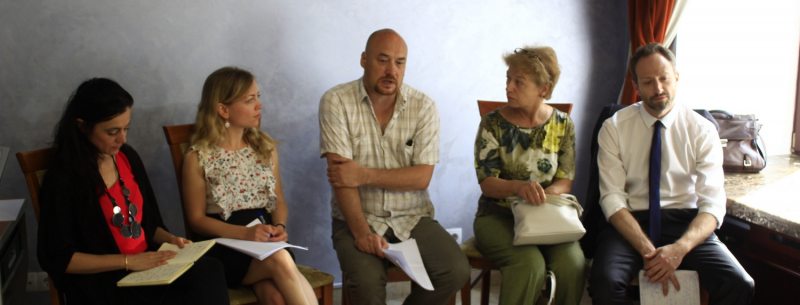“We need a reform of the legal profession”. Human rights activists present joint report on lawyers in Belarus Document
On June 29, a coalition of human rights organizations presented a report about ongoing restrictions on the independence of lawyers in Belarus, which was prepared following a mission in January 2018.

- Participants of the presentation of a joint report on the independence of lawyers in Belarus (left to right) Anne Souleliac, Julia Ouahnon, Valiantsin Stefanovich, Tamara Sidarenka, and Ilya Nuzov. Minsk, June 29, 2018
The mission delegation was composed of Mr. Basile Ader, Attorney at law, Vice President of the Paris Bar, Benoît Deniaud, Attorney at law, Member of the Paris Bar Council, Ms. Julia Ouahnon, Program Officer, Eastern Europe and Central Asia Desk, FIDH and Mr. Hugo Gabbero, Deputy Director of the Observatory for the protection of Human Rights Defenders, FIDH.
During the presentation, Valiantsin Stefanovich of the HRC "Viasna" recalled the events of 2017, when, several lawyers were targeted in Minsk and Mahilioŭ, including those who defended suspects and defendants in politically motivated criminal cases.
“We feared a repeat of 2011, when a number of lawyers who defended persons involved in politically motivated criminal cases, including the case of “mass riots”, were denied licenses. So there was an idea to invite a mission of the International Federation for Human Rights to study the situation and assess the problems of independence of the Bar and as a result of this mission this report was prepared,” Stefanovich said.
Anne Souleliac, a lawyer with the Paris Bar Association, noted that the law “On the Legal Profession” of 2011 allows excessive interference of the Ministry of Justice in the activities of lawyers in violation of the Havana principles.
“I would like to mention a few examples of such interference: the Ministry of Justice issues licenses to practice law. It can initiate disciplinary proceedings against lawyers and it also monitors the election of chairmen of bar associations. And, although a license is issued for life, every five years lawyers must pass recertification process. Besides, there is a procedure of extraordinary certification, in which the Ministry of Justice can test the knowledge of lawyers at any time,” Anne Souleliac said.
The Paris Bar Association calls on the Belarusian authorities to change the law in order to give lawyers more independence and believes that the bar associations will be able to take over the powers, which are now covered by the Ministry of Justice.
Julia Ouahnon highlighted several problematic aspects related to the recertification of lawyer:
- Recertification procedure is controlled by the Ministry of Justice through the qualification commission, which is composed of 17 members, of which only eight are members of the Bar. The other members - they are representatives of state institutions. There is no public information about the commission.
- There is both regular and extraordinary certification. Last year, the Ministry of Justice revealed violations in the work of eight lawyers who defended activists charged in the case of the “White Legion”. Although violations were of a more technical nature, however, the lawyers were forced to pass the procedure, which the law describes in a very broad sense: a lawyer can be asked any question from any area of law, while the law does not specify their amount, nor the duration of the interview.
“It seems very problematic because the law gives the qualification commission such powers that they could at any time be used as a lever of pressure on lawyers,” Julia Ouahnon said.
In turn, Ilya Nuzov, Director of FIDH’s Eastern Europe and Central Asia Desk, stressed that the recertification of lawyers is the consequence of their exercise of freedom of expression:
“Some lawyers faced disciplinary action by the authorities after they made public statements condemning the actions of law enforcement bodies in relation to their clients. And then they were subjected to extraordinary recertification.
This results in self-censorship: lawyers cannot freely exchange views on what is happening in the country in respect of their activities, which unjust actions carried out by the authorities against their clients, who are engaged in political activities,” Ilya Nuzov said.
According to Ilya Nuzov, there are also economic restrictions: lawyers tend to avoid working on cases that may result in certain consequences, which affects the effectiveness of their assistance and the legal profession as a whole.
Tamara Sidarenka, a lawyer who was deprived of her license in 2011, said the report provides an unbiased assessment of the situation and has important implications for the legal profession in Belarus.
According to her, today Belarusian lawyers cannot protect themselves. It is only outside help that can protect lawyers from illegal interference in their activities.
“We, the human rights community, need a reform of the legal profession in such a way that it could truly become an independent body. It is vital for all of us because the independence of lawyers is one of the main components of an independent and fair trial,” Valiantsin Stefanovich said to conclude the presentation.

















